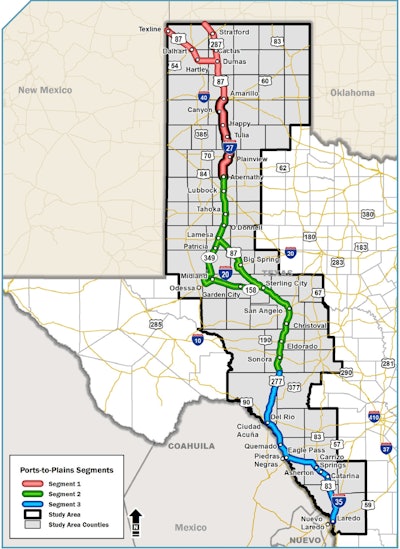
The recently signed $1.5 trillion federal appropriations for 2022 includes the designation of a future Interstate 27 from Texas to New Mexico.
The Ports-to-Plains Corridor, as it is called, is recognized from Laredo, Texas, to Raton, New Mexico, in the legislation signed by President Joe Biden on March 15. The corridor extends down to the Mexican border. The ultimate plan for the corridor is to extend to the Canadian border in future phases, beyond the current designation.
The interstate designation is the first step toward creating the interstate as a four-lane, divided federal highway. The highway would stretch out 963 miles in west and south Texas using existing highways along the way that would be upgraded to interstate standards or new interstate sections developed, according to the Texas Department of Transportation. It would eventually extend the 124 miles of I-27 completed in 1992.
The corridor also includes sections of I-20, I-35, U.S. 83, U.S. 277, U.S. 287, State Highway 158 and State Highway 349. Upgrading the entire corridor would cost $23.5 billion, according to a TxDOT feasibility study in 2020.
The new interstate designation will make Texas and New Mexico eligible for increased federal funding to complete the I-27 expansion project, according to U.S. Rep. Henry Cuellar of Texas.
“The I-27 expansion will grow the Texas GDP by $17.2 billion and create 178,000 construction jobs,” Cuellar says. “It will also add 17,000 long-term employment opportunities in the new I-27 corridor. With this project, Laredo will also become the only port of entry that has three corridors: I-35, I-69, I-27 – a boon for our trade economy.”
The TxDOT feasibility study determined that the extension of I-27 would improve road safety by reducing the annual crash rate by 21%, as well as bring economic growth to the region, increase international trade and bring interstate access to rural areas, according to the Ports-to-Plain Alliance.
The new I-27 Corridor represents three of the eight border crossings along the Texas-Mexico border: Laredo, Eagle Pass and Del Rio, according to the alliance.
“The impact of this designation is tremendous as it allows for the enhancement of infrastructure for domestic and international markets, creates safer roads for leisure and business travels, and connects underrepresented communities throughout the corridor with outside markets,” says John Osborne, alliance chairman.










